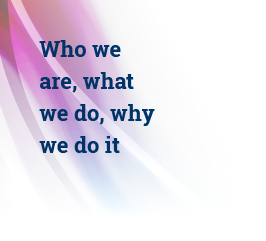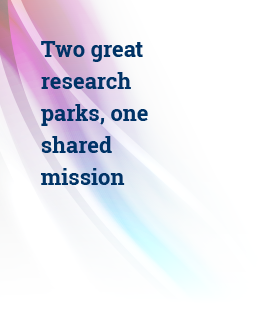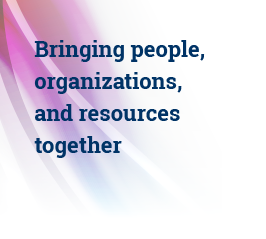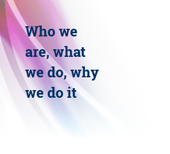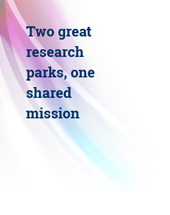Tucson startup Stackhouse’ aims to expand home ownership by reinventing communities
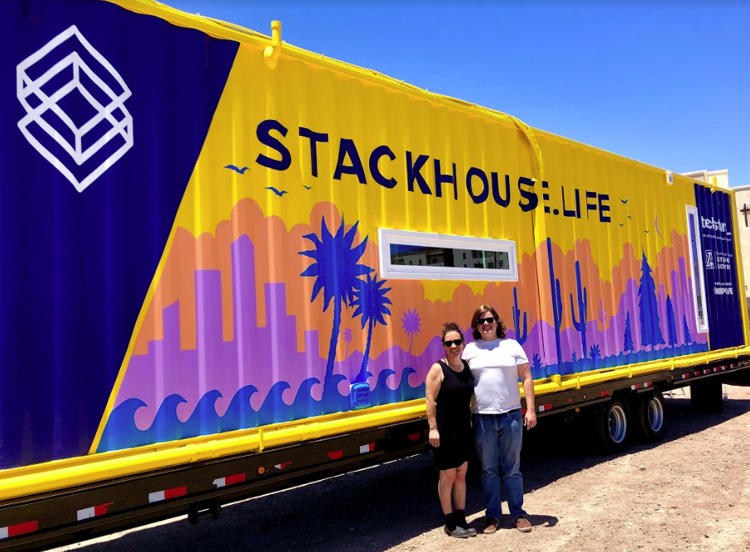
Stackhouse co-founders Janelle Briggs and Ryan Egan next to their container-home model unit on the University of Arizona’s Center for Innovation campus.
Over the past decade, the concept of tiny homes has grown in popular culture, but a real estate startup aligned with the University of Arizona’s Center for Innovation is taking things to the next level. Stackhouse aims to change how people own and finance a home by offering customizable shipping container homes at 320 square feet each.
However, the individual container-homes are only one element of Stackhouse. The startup plans to form these containers into urban residential towers, creating entirely unique communities for residents with a penchant for minimalism.
“We’ve been very intentional with the design of the community so our residents have everything they need,” said Stackhouse CEO Janelle Briggs. “There just hasn’t been any new innovation in the housing space, and the fact this is new, customizable and mobile has people really excited.”
While the Stackhouse model unit is currently located on the UACI campus south of Tucson, the first Stackhouse community is planned for Denver, and will see 62 units placed alongside and on top of each other. While shipping container malls have become more popular over the past few years, Briggs says the country’s extreme housing market is really empowering Stackhouse’s business model. Briggs says the company already has 1,000 people on the Denver waitlist after only a month of advertising.
“It is absolutely an advantage, and an imperative that we fill,” Briggs said. “People need housing, and I foresee us not being able to build fast enough. And while that’s great for our business, I think it’s a problem for the rest of the country that we are not housing our citizens. And that’s why we started this company, because we wanted to help solve that problem.”
Briggs currently lives in the Stackhouse model unit on the UACI tech park with her partner and co-founder Ryan Egan. She says a benefit is that the container-homes don’t have to include anything specific, and are customizable to meet the “living needs” of the resident. As Briggs explains, if cooking a full meal at home isn’t necessary to the resident, but having a dedicated workspace is, Stackhouse can make it happen.
Briggs and Egan founded Stackhouse in 2017, and were accepted into UACI in Oct. 2020. UACI is a startup “incubator” that currently supports 54 businesses by providing resources and connections, both from the university system and the Tucson community. UACI looks to support “scalable science and technology ventures,” helping them through a combination of programming, funding, and forming relationships with fellow startups.
“What makes any startup really attractive is of course novel technology, but there’s also this mix of the mission, and above all else, the team,” said UACI executive director Eric Smith. “Janelle and Ryan, and the support group they’ve built, are truly inspiring as entrepreneurs. They have unmatched motivation, and that’s exactly the team we want to work with… With Stackhouse, it was all about implementation of all of these things. They’d already planned very well, so for us it was all about getting to work.”
For Stackhouse, UACI helped form connections to manufacturing, as well as relationships with municipalities for their housing development. But perhaps most importantly, they were able to provide space for their first unit on UACI’s 1,300-acre tech park.
“Every startup that takes space inside the tech park incubator is unique, and has unique needs, which makes it really exciting,” Smith said. “Stackhouse is of course unique. Very rarely do we have somebody that asks to drop a house on our land, but we were able to make that happen.”
Briggs, who is bi-racial, says her ethnicity has also had an impact on the story of Stackhouse, as well as her focus on inclusion and social change. Both of her parents served in the military, her dad being black and her mom white.
“We were always housed, and having a place to live was not something that I had to worry about, and that was in part because of the good jobs my parents had in the military,” Briggs said. “The world that allowed my parents to meet is very different than the world we find ourselves in now. And who I am in the world is a very different experience than a couple of years ago. Trying to raise money as a first-generation college student is hard. We don’t have the network. Egan and I joke that the biggest win for me was falling in love with a white guy, because he has more access than I do.”
She says even how her and Egan downsized to live in their container-home, and what they decided to keep, was a question of race, privilege and access.
“We’re very proud of the diversity of the entrepreneurs that we serve, both in gender and in race, as well as international representation,” Smith said. “It truly makes the cohort of startups we work with more robust.”
Smith says UACI helps minority-owned startups overcome their unique challenges by connecting them to other founders in their network, and leveraging resources in the community that are specifically there to serve diverse populations of entrepreneurs.
While Briggs, who holds a PhD in speech communications, is passionate about accessibility and entrepreneurship, Egan has worked in real estate his entire career. Briggs says his proficiency is in working with cities to get plans approved for construction. An inspiration for Stackhouse stems from Egan being tasked with managing properties from a former employer, one of which involved a condo entitlement in San Francisco.
“It was just a standard condo building, but the process of getting the city to approve buildings is really difficult and it took him three years to get a 28-unit condo building approved by the City of San Francisco,” Briggs said. “And that’s where he learned how that process worked and how to host effective neighborhood meetings, thinking ‘There’s got to be a more efficient way to do this entitlement process.’ So our goal with Stackhouse is to have a standard building design that we can take to any city that follows the local and municipal code so that it’s easy to approve and we can build quickly across the country.”
Briggs says they are constructing their debut community in Denver because the City of Tucson slowed processing of their Government Property Lease Excise Tax applications, and Stackhouse had to keep moving. Despite this, they had such a positive experience with UACI that they plan to remain members even after moving to Colorado.
“We thought we’d have to wait for a major city to see us building in a place like Tucson first, but we presented the concept blind to the city and had a really great reception,” Briggs said.
The container-homes come from the manufacturer built to Housing and Urban Development code, compliant for all 50 states and insulated for all four USA climate zones, meaning they can withstand temperatures of both Tucson and Denver.
In addition, the community will be equipped with solar panels to be able to be off-grid, and the battery bank for each house will be able to store two days of power. Utilizing technology from a fellow UACI startup, the container-homes will also store all necessary water on every floor.
“A lot of the work that we do is not pretending we know everything, it’s really about leveraging the connections the university has to get them to the people that do know those specific areas,” Smith said.
Although Stackhouse is leaving the Tucson area, Smith says the majority of startups UACI has served since 2003 have stayed in Arizona. But in the last year and a half, they’ve expanded their virtual footprint to serve companies that have never even existed in Southern Arizona.
“UACI is a place where if you’re a startup in their program and you need something, they will lift heaven and earth to help you be successful,” Briggs said. “It’s so amazing to be standing in the house we envisioned four years ago. It’s real and I’m so proud of us and thankful for the support Tucson has given us.”
Read the Original Tucson Local Media Article by Jeff Gardner Here






